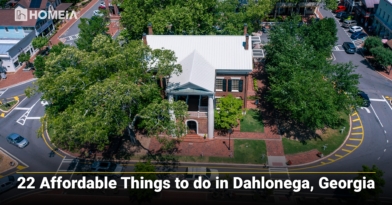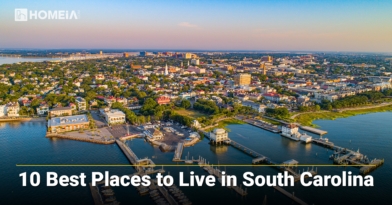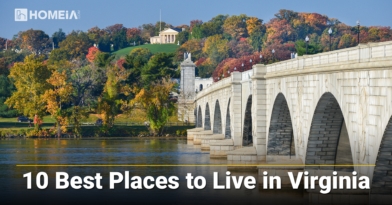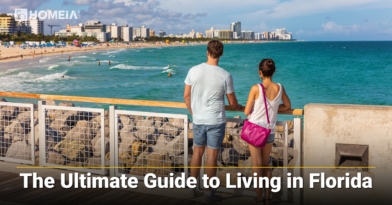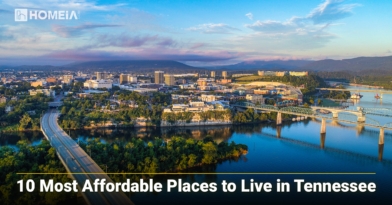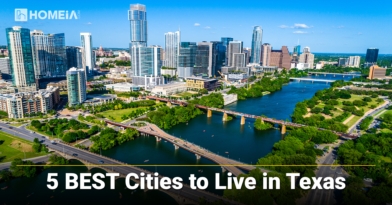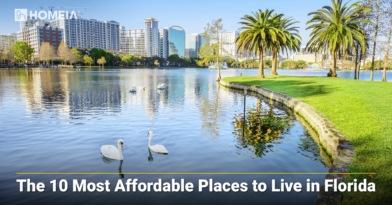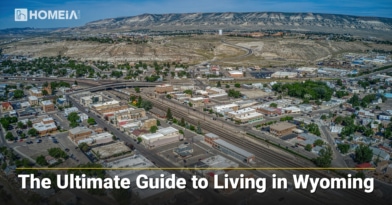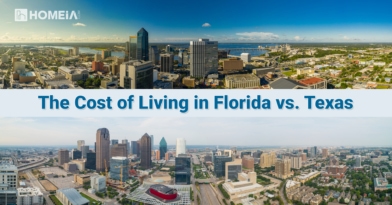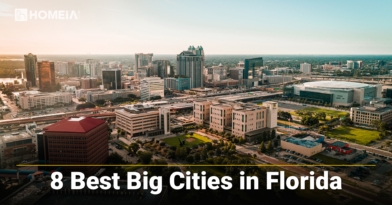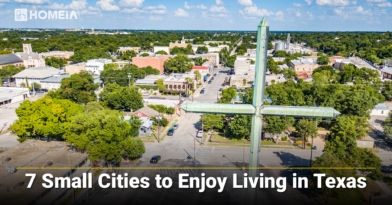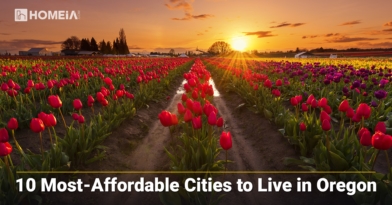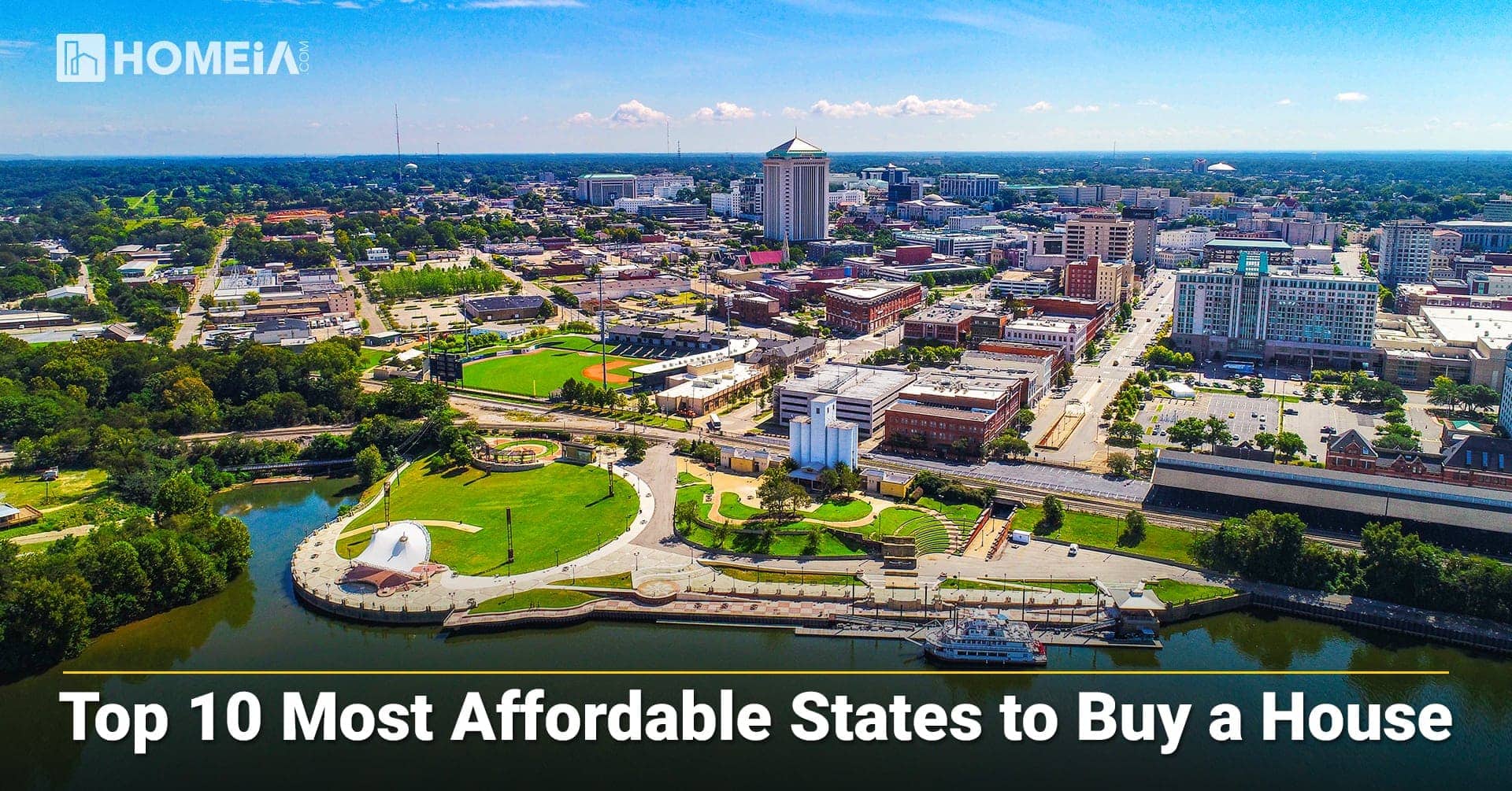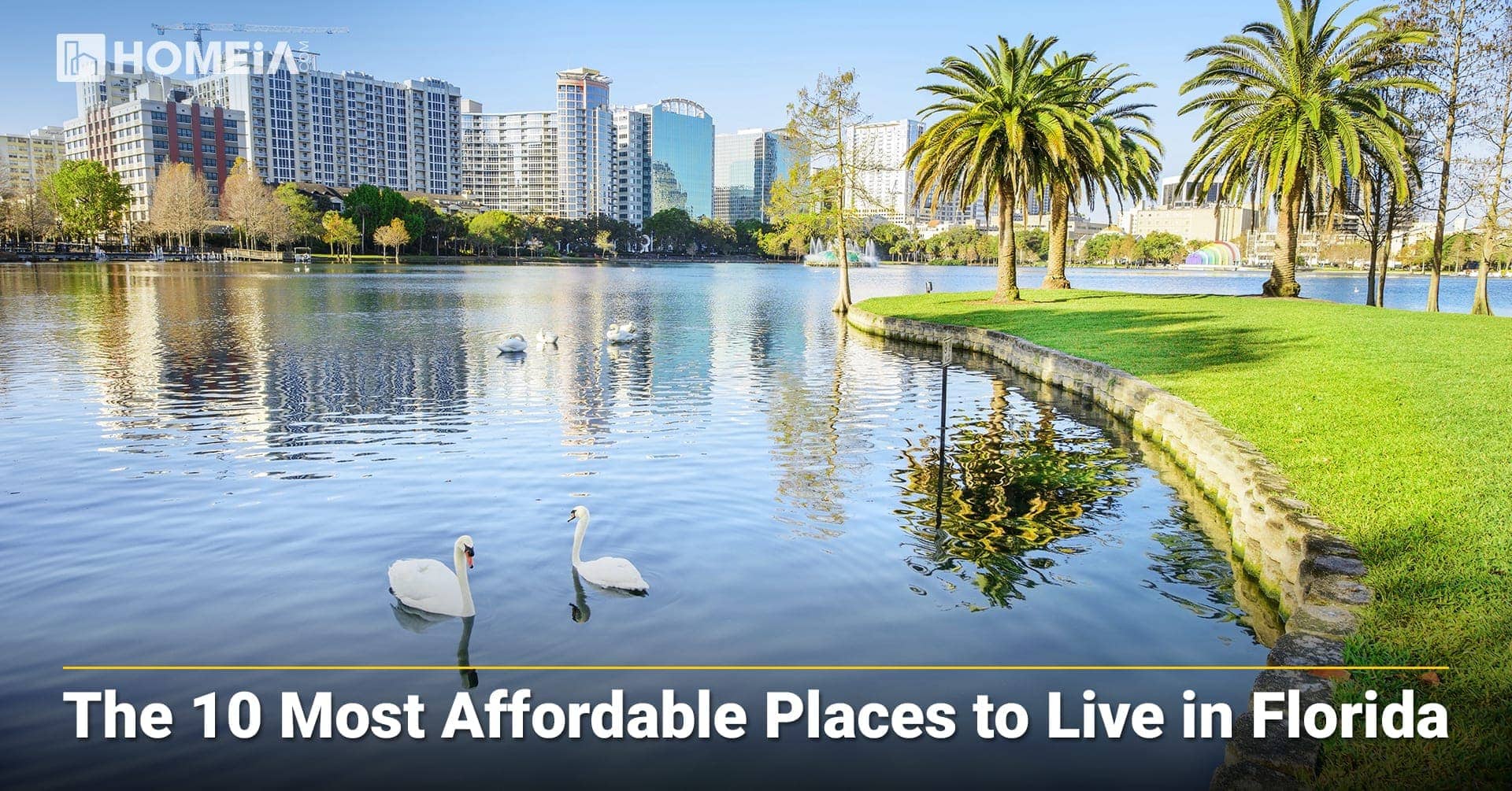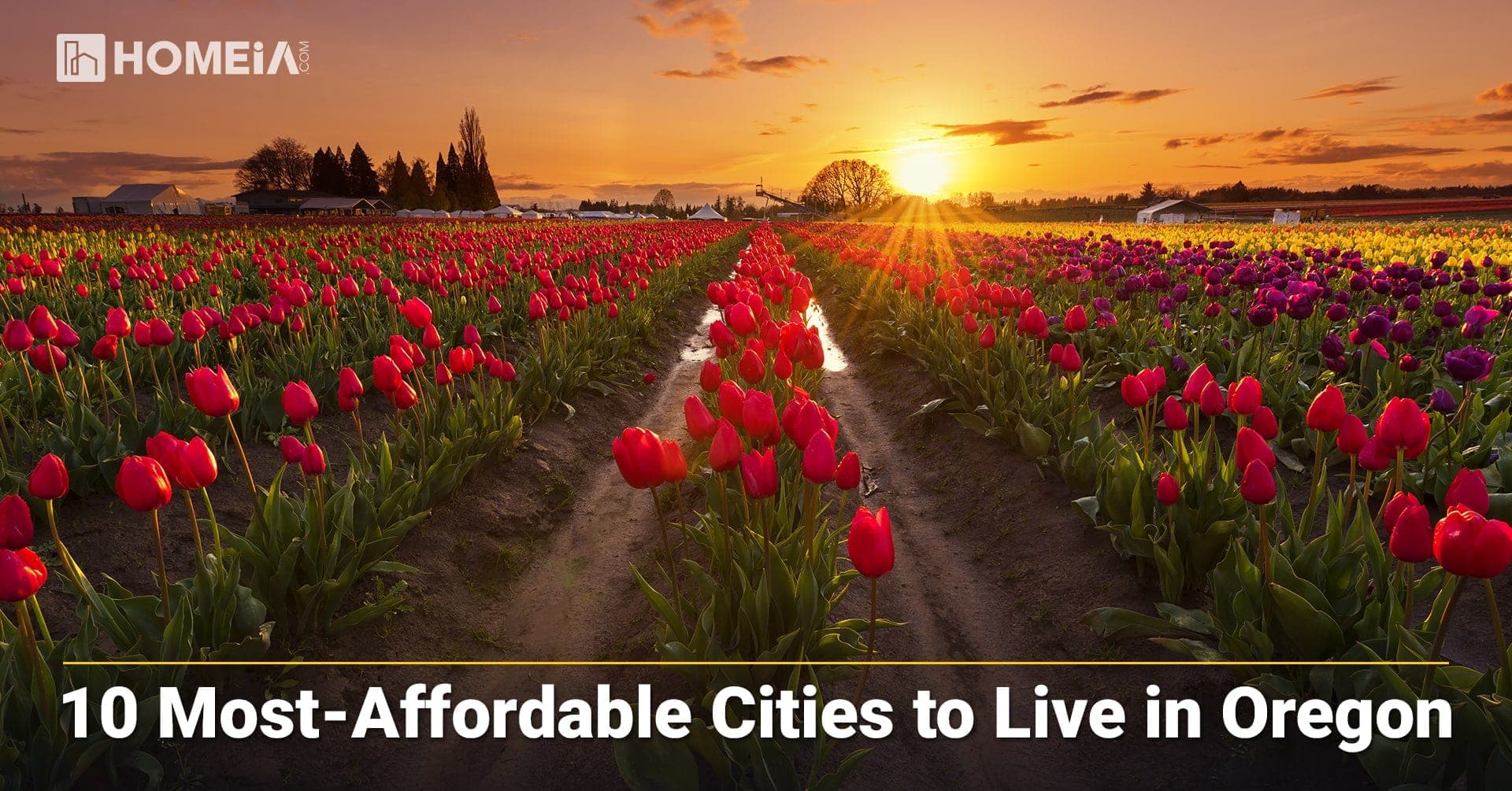Pros and Cons of Living in Georgia
- Author:by The HOMEiA Team
- Category: City Living Guide
Relocating to a new state can be a difficult decision to make. Not only do you need to look at the state as a whole, but you also need to consider the specific community you’ll become a part of. Fortunately, if you’re planning on making the move to Georgia, you have a variety of options to choose from. Whatever your age, budget, family dynamics or preferences, there’s a little something for everyone in this beautiful state.
In this article, we’ll present you with both pros and cons about life in Georgia along with a list of top cities to settle down in based on a few different factors. We’ll also provide you with a checklist to help make the moving process just a little easier.
Section one will begin with some of the reasons why Georgia is a great place to call home, then a few disadvantages to keep in mind, as well as some interesting facts about the Peach State.
In Sections II through IV, we’ll examine some great destinations for the following groups:
- II. Young professionals just starting out
- III. Couples who have young kids
- IV. Retired folks looking to live their golden years in the warm weather
For each community within Sections II through IV, we assign a Score, which provides an overall assessment — based on affordability, employment, lifestyle, healthcare, education and other relevant factors — of the city’s appeal as a place to call home.
Below are all important things you should know before living in Georgia.
Table of Contents:
The Pros and Cons of Living in Georgia
Living in Georgia, a state in the southeastern United States, comes with its own set of advantages and disadvantages. It’s important to note that people’s experiences can vary widely depending on factors such as location within the state, personal preferences, and individual circumstances. Here are some pros and cons of living in Georgia:
Pros:
Affordable Cost of Living: Georgia generally has a lower cost of living compared to many other states, especially in terms of housing. This makes it an attractive option for those looking to stretch their budget.
Diverse Geography: Georgia boasts diverse geography, including mountains in the north, coastal areas in the southeast, and lush forests. This diversity provides opportunities for outdoor activities like hiking, skiing, and water sports.
Warm Climate: The state enjoys a generally mild climate, with hot summers and mild winters, making it an appealing choice for those who prefer warmer weather.
Strong Job Market: Georgia is home to several major cities, including Atlanta, which offer a robust job market with opportunities in various industries, including technology, healthcare, and logistics.
Cultural and Historical Heritage: Georgia has a rich cultural and historical heritage, with many museums, historic sites, and cultural events celebrating its past and present.
Southern Hospitality: Georgia is known for its friendly and welcoming people, often referred to as “Southern hospitality.” This can create a positive and inclusive atmosphere for residents and newcomers.
Education: Georgia has a number of respected colleges and universities, including the University of Georgia and Georgia Institute of Technology, which can provide excellent educational opportunities.
Cons:
Traffic Congestion: In major cities like Atlanta, traffic congestion can be a significant issue. Commuting times can be long, and rush-hour traffic can be frustrating.
Hot and Humid Summers: While some people appreciate the warm climate, the hot and humid summers can be uncomfortable for those who prefer cooler weather.
Limited Public Transportation: Public transportation options are limited in many parts of Georgia, especially outside of major cities. This can make owning a car a necessity.
Natural Disasters: Georgia is susceptible to natural disasters such as hurricanes, tornadoes, and occasional severe storms. Coastal areas are particularly vulnerable to hurricane-related damage.
Education Challenges: While Georgia has excellent educational institutions, it also faces challenges in its public education system, with variations in school quality across different areas.
Income Inequality: Georgia has a significant income inequality gap, with some areas experiencing higher poverty rates and limited access to opportunities.
Healthcare Access: Access to healthcare can be an issue in rural areas of the state, and not all residents have easy access to quality medical services.
Ultimately, the decision to live in Georgia will depend on your personal preferences and priorities. It’s essential to consider factors like your job prospects, lifestyle preferences, and tolerance for climate and traffic when evaluating whether Georgia is the right place for you.
10 Best Places to Live in Georgia in 2024
If you’re looking for some good old-fashioned Southern hospitality, look no further than Georgia. The Peach State has plenty of small-town charm to welcome you in, as well as big-city development, artistic expression and innovation…
Now let’s get into some fun facts about the Peach State.
- Among other things, Georgia is the birthplace of Coca-Cola, the cotton gin, the Girl Scouts and the Civil Rights Movement.
- The University of Georgia, located in Athens, was the first public university in the United States to be created by state charter. Wesleyan College, located in Macon, was the first college in the world to offer degrees to women.
- If your destination’s address is on Peachtree, you might need some more information. There are more than 70 different streets in the Atlanta area with “Peachtree” in their names!
- While most people know Georgia for its peaches, the state also produces larger amounts of pecans and peanuts than any other state. And don’t forget about Georgia’s Vidalia onions, which are famous for their sweetness.
- If you’re a movie buff, there are many notable filming locations in Georgia. Popular movies filmed in various parts of Georgia include “Forrest Gump,” “The Hunger Games,” “The Black Panther” and many more. And if you’re more into television series, shows such as “The Walking Dead” and “Stranger Things” were also filmed at various locations in Georgia.
Recommended for you
Best Cities to Live in Georgia for Young Professionals
The following cities have a relatively young population, with good employment opportunities and amenities. They are also affordable places to buy or rent homes, for the most part, making them a good fit for young professionals.
The cities are listed in order of their cost of living, from lowest to highest. The HOMEiA Index Scores are assigned based on a wider range of attributes.
1. Columbus
HOMEiA Score: 85/100
- Population: 206,922 | Rank Last Year: #6
- Cost of Living: 24% below the U.S. national average
- Home price to income ratio: $141,300/$46,408 = 3.04 (buying homes is affordable)
- Income to rent ratio: $46,408/$10,872 = 4.27 (renting homes is affordable)
Columbus is located on the western edge of central Georgia. The population in Columbus grew by 9.0% from April 2010 through April 2020, above the overall U.S. rate of 7.4% but below the Georgia rate of 10.6%.
The population in Columbus is young, with 24.8% of the population under 18 and only 13.0% over 65 years old.
The median household income in Columbus is $46,408, and the median home price is $141,300 (2019 estimates). The unemployment rate is 3.8% (July 2021), which is below the U.S. national rate of 5.4% and just above the Georgia rate of 3.7%.
Columbus has many options for higher education. Columbus State University offers both undergraduate and graduate programs, while Columbus Technical College is a two-year technical school. There are two beauty schools in Columbus: Rivertown School of Beauty and Southeastern Beauty School. Georgia Military College and several colleges and universities based in other states also have locations in Columbus.
Columbus is home to more than 50 parks. Because it sits right on the Chattahoochee River, there’s no shortage of outdoor adventures to be had. Downtown Columbus features Chattahoochee Whitewater Park, where you can brave the rapids (on the largest urban whitewater course in the world, no less), go biking or even ride a zipline across the river.
For nightlife, shopping, concerts and other entertainment options, look no further than Uptown, and don’t miss the Saturday morning Market Days on Broadway.
The 22 Affordable Things to do in Dahlonega, Georgia
The advantage of being such a small city is that it can sustain a very affordable cost of living — and vacationing, too. Low-cost attractions abound in Lumpkin County; locals and vacationers will find no shortage of things to do…
2. Macon
HOMEiA Score: 87/100
- Population: 157,346 | Rank Last Year: #2
- Cost of Living: 23% below the U.S. national average
- Home price to income ratio: $120,200/$41,334 = 2.91 (buying homes is very affordable)
- Income to rent ratio: $41,334/$9,816 = 4.21 (renting homes is affordable)
Macon is located right in the middle of Georgia. The population in Macon grew by 1.7% from April 2010 through April 2020, substantially above both the overall U.S. rate of 7.4% and the Georgia rate of 10.6%.
The population in Macon is young, with 24.6% of the population under 18 and only 15.2% over 65 years old.
The median household income in Macon is $41,334, and the median home price is $120,200 (2019 estimates). The unemployment rate is 3.5% (July 2021), which is below both the U.S. national rate of 5.4% and the Georgia rate of 3.7%.
There are around 30,000 college students in Macon. Both Mercer University (a private research university) and Middle Georgia State University have their main campuses in the city. There are also two technical colleges: Central Georgia Technical College and a satellite campus of Miller-Motte Technical College. Wesleyan College, a private women’s liberal arts college, is also located in Macon.
Nicknamed “The Heart of Georgia,” Macon is a college town with a love for art and music. For outdoor activities, you can explore 180 acres of natural beauty in Amerson River Park and also go kayaking, tubing or canoeing.
Don’t miss the annual International Cherry Blossom Festival, held every March, or the Macon Film Festival every July. For history buffs, Macon has plenty of museums and historical sites, including Ocmulgee Mounds National Historical Park.
The 10 Best Places to Live in South Carolina for Families
In addition to the coastal beauty of well-known cities like Charleston and Myrtle Beach, South Carolina has an abundance of places across the midlands and the upstate filled with opportunities to enjoy small-town charm or big-city living…
3. Augusta
HOMEiA Score: 86/100
- Population: 202,081 | Rank Last Year: #5
- Cost of Living: 21% below the U.S. national average
- Home price to income ratio: $108,000/$42,592 = 2.54 (buying homes is very affordable)
- Income to rent ratio: $42,592/$10,656 = 4.00 (renting homes is affordable)
Augusta is located on the eastern side of Georgia, right next to the South Carolina border. The population in Augusta grew by 3.2% from April 2010 through April 2020, which was below the overall U.S. rate of 7.4% and the Georgia rate of 10.6%.
The population in Augusta is young, with 23.1% of the population under 18 and only 13.5% over 65 years old.
The median household income in Augusta is $42,592, and the median home price is $108,000 (2019 estimates). The unemployment rate is 3.6% (July 2021), which is below both the U.S. national rate of 5.4% and the Georgia rate of 3.7%.
Augusta is home to Augusta Technical College, Augusta State University, and Paine College, which is a private Methodist college. Satellite campuses of East Georgia State College, Georgia Military College and Brenau University are also located in Augusta.
Downtown Augusta is a great location for shopping, dining and enjoying the nightlife. Visit local shops downtown or take a stroll down the Riverwalk. For those seeking outdoor adventures, the Savannah River affords all kinds of activities, such as kayaking, mountain biking and skiing.
If arts and entertainment are more your thing, there are plenty of galleries and museums to fill your free time.
10 Best Places to Live in Virginia in 2024
Virginia is an amazing place. Where else can you find mountains and beaches, high-end horse-racing communities and small towns with neighbors who travel by wagon — all within a two-hour drive?…
4. Savannah
HOMEiA Score: 90/100
- Population: 147,780 | Rank Last Year: #2
- Cost of Living: 12% below the U.S. national average
- Home price to income ratio: $156,500/$43,307 = 3.61 (buying homes is affordable)
- Income to rent ratio: $43,307/$12,228 = 3.54 (renting homes is affordable)
Savannah is located on Georgia’s east coast, just below the South Carolina border. The population in Savannah grew by 8.4% from April 2010 through April 2020, above the overall U.S. rate of 7.4% but below the Georgia rate of 10.6%.
The population in Savannah is young, with 20.4% of the population under 18 and only 13.1% over 65 years old.
The median household income in Savannah is $43,307, and the median home price is $156,500 (2019 estimates). The unemployment rate is 3.1% (July 2021), which is below both the U.S. national rate of 5.4% and the Georgia rate of 3.7%.
Several colleges and universities are located in Savannah. These include Savannah State University, Savannah College of Art and Design, and the Armstrong Campus of Georgia Southern University. Savannah Technical College is the public community college, and the University of Georgia’s Skidaway Institute of Oceanography is located nearby on Skidaway Island.
Being a coastal city, Savannah is a great destination for seafood. It’s also located very near a number of popular islands off Georgia’s coast, including Jekyll Island and Tybee Island, making it easy to slip away for an afternoon at the beach.
Savannah is known for its history, and it’s full of beautiful historic architecture. It’s also a famously haunted destination and there are lots of ghost tours you can go on if you’d like an even closer, more mysterious look at the city’s past.
Pros and Cons of Living in Florida
If you’ve decided to make Florida your new home, you’re in luck – it’s a big and varied place, with something for all ages, family dynamics and budget. Continue reading as we dive into some notable Pros and Cons about the state itself, the top cities to live in across a variety of categories, and…
5. Athens
HOMEiA Score: 88/100
- Population: 127,315 | Rank Last Year: #3
- Cost of Living: 12% below the U.S. national average
- Home price to income ratio: $171,000/$38,311 = 4.46 (buying homes is expensive)
- Income to rent ratio: $38,311/$10,272 = 3.73 (renting homes is affordable)
Athens is located in northeast Georgia. The population in Athens grew by 10.3% from April 2010 through April 2020, above the overall U.S. rate of 7.4% but just below the Georgia rate of 10.6%.
The population in Athens is young, with 17.3% of the population under 18 and only 10.5% over 65 years old.
The median household income in Athens is $171,700, and the median home price is $38,311 (2019 estimates). The unemployment rate is 2.8% (July 2021), which is below both the U.S. national rate of 5.4% and the Georgia rate of 3.7%.
Athens is home to the University of Georgia (or UGA). The mascot is Uga, an English Bulldog, and there’s a fierce statewide rivalry between fans of the Georgia Bulldogs and fans of the Georgia Tech (Georgia Institute of Technology) Yellow Jackets. Popular majors at UGA include Finance, Biology, Psychology and Marketing.
Athens also has several other colleges: Athens Technical College, Augusta University, Piedmont College and Athens College of Ministry.
Because of the large student population, Athens is a thriving college town with a vibrant live music scene. If you’re a sports fan, you can easily attend UGA events — and most of them for free.
There are also plenty of outdoor activities and parks to explore. The more artistically inclined can visit the Georgia Museum of Art, take in the murals around town or check out the many art galleries, theaters and museums.
The downtown area is characterized by restored Victorian-era architecture and local small businesses. For something truly unique, be sure to pay a visit to the Tree that Owns Itself.
10 Most Affordable Places to Live in Tennessee
Travel aficionados who are looking to fill up their bucket list with various visits to fun U.S. states should most definitely pencil in Tennessee as one of their destinations. The people in the so-called Volunteer State (Go Vols!) are genuinely friendly folks who never fail to provide visitors with…
6. Decatur
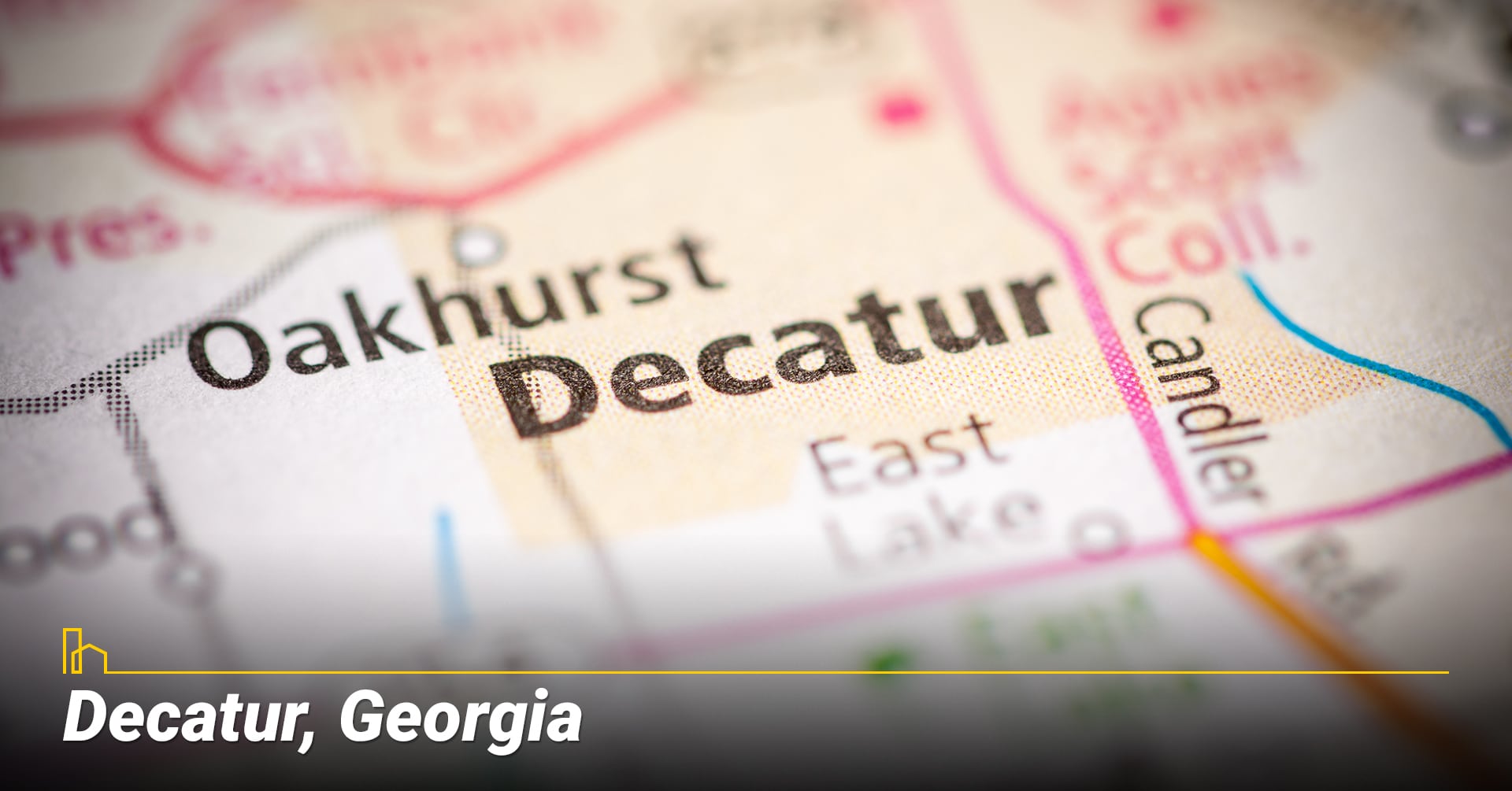
HOMEiA Score: 98/100
- Population: 24,928 | Rank Last Year: #1
- Cost of Living: 2% above the U.S. national average
- Home price to income ratio: $521,900/$106,088 = 4.92 (buying homes is expensive)
- Income to rent ratio: $106,088/$12,180 = 8.71 (renting homes is very affordable)
Decatur is located just northeast of Atlanta. The population in Decatur grew by 28.9% from April 2010 through April 2020, above both the overall U.S. rate of 7.4% and the Georgia rate of 10.6%.
The population in Decatur is young, with 32.2% of the population under 18 and only 12.4% over 65 years old.
The median household income in Decatur is $106,088, and the median home price is $521,900 (2019 estimates). The unemployment rate is 3.2% (July 2021), which is below both the U.S. national rate of 5.4% and the Georgia rate of 3.7%.
There are a number of colleges and universities located in Decatur. Georgia State University’s Perimeter College provides two-year Associate degrees that can be transitioned into further studies at Georgia State. Two other universities have campuses in Decatur: DeVry University and Emory University.
There are also two religiously affiliated colleges: Agnes Scott College (a private women’s liberal arts college) and Columbia Theological Seminary.
In Decatur, you’ll find all the great food and drinks, live music and festivals you could want. It’s known for its diverse, artsy locale and for its small-town feel but big-city convenience. Peruse the downtown shops and boutiques, enjoy local craft beer and cocktails, tour the public art displays, catch live music from up-and-coming artists and much, much more.
The city also offers Decatur 101 classes, where residents can learn more about Decatur’s history and culture and how to be directly involved in its future.
Recommended for you
Best Places to live in Georgia for Families with Young Kids
1. Woodstock

HOMEiA Score: 85/100
- Population: 35,065 | Rank Last Year: #5
- Cost of Living: 12% above the U.S. national average
- Home price to income ratio: $243,500/$76,191= 3.20 (buying homes is affordable)
- Income to rent ratio: $76,191/$16,104 = 4.73 (renting homes is affordable)
Woodstock is located in northern Georgia. The population in Woodstock grew by 46.7% from April 2010 through April 2020, substantially above both the overall U.S. rate of 7.4% and the Georgia rate of 10.6%.
The population in Woodstock is relatively young, with 25.2% of the population under 18 years of age.
The median household income in Woodstock is $76,191 and the median home price is $243,500 (2019 estimates). The unemployment rate is 3.2% (July 2021), which is below both the U.S. national rate of 5.4% and the Georgia rate of 3.7%.
There are 14 public schools and 36 private schools in the Woodstock area, including three public high schools and two private high schools. There are also a few options for higher education, such as the Woodstock campus of Chattahoochee Technical College.
Take the kids out to hit the trails on one of the many nature areas that are part of the city’s Greenprints Project. There’s endless fun to be had at The Valley, a huge playground with play areas for kids of all ages. In the summer, kids will love cooling off in the water at the splash pad at Cline Park, which features three fountains, water jets and more.
There are several options for medical care in Woodstock. Piedmont Physicians of Towne Lake offers primary care. Other medical facilities include Woodstock Urgent Care Center and Wellstar Towne Lake Medical Center.
5 Best Places to Live in Texas
Each of the five large cities described are chock-full of neighborhoods that are favored by families with children, young professionals, and retirees. We’ll focus on eight critical attributes that often define a city: History and population, Lifestyle, Affordability, Housing market and neighborhoods, Healthcare and safety, Employment…
2. Suwanee
HOMEiA Score: 90/100
- Population: 20,786 | Rank Last Year: #3
- Cost of Living: 16% above the U.S. national average
- Home price to income ratio: $308,900/$90,436 = 3.42 (buying homes is affordable)
- Income to rent ratio: $90,436/$17,856 = 5.06 (renting homes is affordable)
Suwanee is a suburb of Atlanta. The population in Suwanee grew by 35.4% from April 2010 through April 2020, substantially above both the overall U.S. rate of 7.4% and the Georgia rate of 10.6%.
The population in Suwanee is relatively young, with 23.8% of the population under 18.
The median household income in Suwanee is $90,436 and the median home price is $308,900 (2019 estimates). The unemployment rate is 3.2% (July 2021), which is below both the U.S. national rate of 5.4% and the Georgia rate of 3.7%.
There are 15 public schools and 32 private schools in the Suwanee area, including one public high school and two private high schools. There are also a few options for higher education, such as the Georgia campus of the Philadelphia College of Osteopathic Medicine.
Suwanee Town Center is a great place to hang out, and kids will enjoy the interactive fountain as well as the public green space. Suwanee has lots of other parks to explore, too, the largest being Georgia Pierce Park, which has all kinds of sports fields, play areas and trails. Kids will also love PlayTown Suwanee, a community playground built by the people of Suwanee for their children to enjoy.
There are several medical centers located near Suwanee. Among these are Gwinnett Medical Center campuses in Duluth and Lawrenceville and three satellite locations of Children’s Healthcare of Atlanta.
10 Most Affordable Places to Live in Florida in 2024
With year-round warm weather and over 8,000 miles of coastline, it’s no wonder Florida is a prime vacation destination. Filled with wildlife, beaches, lakes, rivers, amusement parks, diverse entertainment options and much more, the population of Florida is growing with people that want to call Florida “home,” soak up the sun…
3. Alpharetta
HOMEiA Score: 97/100
- Population: 65,818 | Rank Last Year: #1
- Cost of Living: 26% above the U.S. national average
- Home price to income ratio: $422,800/$113,802 = 3.72 (buying homes is affordable)
- Income to rent ratio: $113,802/$17,412 = 6.54 (renting homes is very affordable)
Alpharetta is located north of Atlanta. The population in Alpharetta grew by 14.4% from April 2010 through April 2020, above both the overall U.S. rate of 7.4% and the Georgia rate of 10.6%.
The population in Alpharetta is relatively young, with 26.6% of the population under 18 years of age.
The median household income in Alpharetta is $113,802, and the median home price is $422,800 (2019 estimates). The unemployment rate is 3.2% (July 2021), which is below both the U.S. national rate of 5.4% and the Georgia rate of 3.7%.
There are 28 public schools and 95 private schools in the Alpharetta area, including four public high schools and six private high schools. There are also a handful of options for higher education, such as the Alpharetta campuses of Georgia State University and Gwinnett Technical College.
Keep the kids active by walking, skating or biking on Alpharetta’s Big Creek Greenway or ice skating at Alpharetta Family Skate Center. Or bring them along to the weekly Alpharetta Farmers Market during the spring to early fall months. There’s also a lot of family-friendly shopping and dining in downtown Alpharetta and at Avalon shopping center.
There are a number of healthcare options in Alpharetta, including Northside Hospital’s Alpharetta campus, which features a whole range of medical services, from pediatrics to psychiatry.
Pros and Cons of Living in Wyoming in 2024
Choosing to relocate can be quite overwhelming. Once you decide on a state, you still need to choose the right community. If you’ve decided to make Wyoming your new home, you’re in luck — it’s a big and varied place with something for all ages, family dynamics and budgets…
4. Roswell

HOMEiA Score: 87/100
- Population: 92,833 | Rank Last Year: #4
- Cost of Living: 27% above the U.S. national average
- Home price to income ratio: $374,700/$99,726 = 3.76 (buying homes is affordable)
- Income to rent ratio: $99,726/$15,372 = 6.94 (renting homes is very affordable)
Roswell is located north of Atlanta. The population in Roswell grew by 5.1% from April 2010 through April 2020, below both the overall U.S. rate of 7.4% and the Georgia rate of 10.6%.
The population in Roswell is relatively young, with 25.1% of the population under 18 years of age.
The median household income in Roswell is $99,726, and the median home price is $374,700 (2019 estimates). The unemployment rate is 3.2% (July 2021), which is below both the U.S. national rate of 5.4% and the Georgia rate of 3.7%.
There are 17 public schools and 46 private schools in the Roswell area, including three public high schools and 11 private high schools. There are also a few options for higher education nearby, such as the Roswell campus of Strayer University.
Roswell prides itself on being a family-friendly destination. Take the kids to an interactive experience at Roswell Cultural Arts Center or explore the many local parks and recreational areas, such as the Chattahoochee Nature Center, which has family events in addition to the regular outdoor activities. There are also plenty of family-oriented restaurants, shops and more.
Roswell has a number of hospital and medical center options, such as Wellstar North Fulton Hospital, Grady Health’s North Fulton Health Center and American Family Care’s Roswell Urgent Care Center.
The 9 Cheapest and Safest Places to Live in Florida in 2024
Get ready to explore some of Florida’s safest small communities for the affluents. From coastal towns to pleasant inland locations, there will surely be something for everyone who can afford the lifestyle…
5. Johns Creek

HOMEiA Score: 96/100
- Population: 82,453 | Rank Last Year: #2
- Cost of Living: 30% above the U.S. national average
- Home price to income ratio: $400,100/$122,514 = 3.27 (buying homes is affordable)
- Income to rent ratio: $122,514/$12,744 = 9.61 (renting homes is very affordable)
Johns Creek is a suburban community of metro Atlanta. The population in Johns Creek grew by 7.5% from April 2010 through April 2020, above the overall U.S. rate of 7.4% and below the Georgia rate of 10.6%.
The population in Johns Creek is young, with 26.6% of the population under 18.
The median household income in Johns Creek is $122,514, and the median home price is $400,100 (2019 estimates). The unemployment rate is 3.2% (July 2021), which is below both the U.S. national rate of 5.4% and the Georgia rate of 3.7%.
There are two public schools and nine private schools in the Johns Creek area, including one public high school and two private high schools. There are also several options in the area for higher education, such as Gwinnett Technical College in Lawrenceville and Georgia Perimeter College in Decatur.
Johns Creek is a great place to discover nature, with a number of parks and recreational facilities. Newtown Park is the spot for youth sports as well as a community garden. Another great place for kids to learn about the local wildlife is Audrey Mill Nature Preserve and Heritage Center, with structures dating back to the 1800s, woodlands and trails, live animals, play areas and more.
Johns Creek also has a number of healthcare options. Some of these include Emory Johns Creek Hospital, North Atlanta Primary Care’s Johns Creek campus and Johns Creek Family Medicine.
Recommended for you
Best Places to Retire in Georgia
Key economic and demographic data on Macon was presented in Section II above (Great Options for Young Professionals), along with information on certain amenities. In this section, we present additional information that will be of interest to retirees – such as the age of the population, healthcare and other activities and attractions suitable for seniors.
There is a plethora of golfing options in Macon, for players of all ages and skill levels. There are also plenty of parks and other outdoor recreation facilities. Enjoy the beautiful trees, especially during the annual Cherry Blossom festival and the historical architecture. If you love the arts, you’ll have a wide array of theater and dance performances to watch, from Broadway to ballet to the Macon Symphony Orchestra.
Atrium Health Navicent in Macon is Georgia’s second-largest hospital and a Level I-designated trauma center. Piedmont Macon Medical Center is also a well-regarded hospital, with services ranging from emergency to robotic surgery.
The Cost of Living in Florida vs. Texas
Texas and Florida are vast and have hundreds of communities to choose from. But what are the pros and cons of living in each state? Come with HOMEiA as we explore 7 crucial factors that reveal the true costs of choosing Florida or Texas as your new home…
1. Augusta
HOMEiA Score: 93/100
- Population: 157,346 | Rank Last Year: #2
- Cost of Living: 23% below the U.S. national average
- Home price to income ratio: $120,200/$41,334 = 2.91 (buying homes is very affordable)
- Income to rent ratio: $41,334/$9,816 = 4.21 (renting homes is affordable)
Key economic and demographic data on Augusta was presented in Section II above (Great Options for Young Professionals), along with information on certain amenities. In this section, we present additional information that will be of interest to retirees – such as the age of the population, healthcare and other activities and attractions suitable for seniors.
In Augusta, 13.5% of the population are seniors over 65 years of age (2019). This is lower than the U.S. overall (16.5% seniors) and Georgia (23.6% seniors). By comparison, 23.1% of the population is under 18 years of age, compared to 22.3% in the U.S. and 23.6% in Georgia.
The median household income in Augusta is $42,592, and the median home price is $108,000 (2019 estimates). The unemployment rate is 3.6% (July 2021), which is below both the U.S. national rate of 5.4% and the Georgia rate of 3.7%.
Golf fans will know Augusta as the location of the Masters Golf Tournament.
You also can enjoy a leisurely view along the Riverwalk, with its shops, art and history museums and gardens. You’ll also enjoy taking in the Augusta Market during the spring and summer months.
You can also go on various tours to learn about the city’s history and culture, from trolley tours to boat tours.
Augusta University extends free classes, as space allows, to residents aged 62 years or older.
Augusta has numerous healthcare facilities, including primary care, specialties, and hospitals. Many are part of Augusta University Health, a network including Augusta University Medical Center.
The 8 Largest Cities in Florida
For each of these communities, we assign a HOMEiA Score, which provides an overall assessment – based on affordability, lifestyle, healthcare, education and other relevant factors – of the city’s appeal as a place to call home…
2. Savannah
HOMEiA Score: 82/100
- Population: 202,081 | Rank Last Year: #5
- Cost of Living: 21% below the U.S. national average
- Home price to income ratio: $108,000/$42,592 = 2.54 (buying homes is very affordable)
- Income to rent ratio: $42,592/$10,656=4.00 (renting homes is affordable)
Key economic and demographic data on Savannah was presented in Section II above (Great Options for Young Professionals), along with information on certain amenities. In this section, we present additional information that will be of interest to retirees – such as the age of the population, healthcare and other activities and attractions suitable for seniors.
In Savannah, 13.1% of the population are seniors over 65 years of age (2019). This is lower than in the U.S. overall (16.5% seniors) and in Georgia (23.6% seniors). By comparison, 20.4% of the population is under 18 years of age, compared to 22.3% in the U.S. and 23.6% in Georgia.
The median household income in Savannah is $43,307, and the median home price is $156,500 (2019 estimates). The unemployment rate is 3.1% (July 2021), which is below both the U.S. national rate of 5.4% and the Georgia rate of 3.7%.
Savannah is a beautiful place to take in the historical sights. There’s no limit to the amount of history you can learn from the many museums, tours and historical sites. Beaches are nearby and easily accessible, including popular destinations like Tybee Island and Jekyll Island. There are also dining options to suit any taste and plenty of park benches from which to relax and watch the city streets.
There are two major health care centers in Savannah, both of which have received national recognition. These facilities are Memorial University Medical Center, which offers primary and specialty care and St. Joseph’s/Candler Health System.
7 Best Small Towns to Live in Texas
We present 7 smaller cities that are great for professionals, retirees, and families with children. Incidentally, they also happen to be places that I have enjoyed visiting with family and friends over the decades. In our examination, we’ll prioritize things that may be more important for families who prefer not to live in heavily urbanized areas…
3. Woodstock

HOMEiA Score: 88/100
- Population: 147,780 | Rank Last Year: #4
- Cost of Living: 12% below the U.S. national average
- Home price to income ratio: $156,500/$43,307 = 3.61 (buying homes is affordable)
- Income to rent ratio: $43,307/$12,228 = 3.54 (renting homes is affordable)
Key economic and demographic data on Woodstock was presented in Section III above (Cities to Suit Families with Young Kids), along with information on certain amenities. In this section, we present additional information that will be of interest to retirees – such as the age of the population, healthcare and other activities and attractions suitable for seniors.
Woodstock is a great place to enjoy the beauty of nature. Walk or relax at Old Rope Mill Park or walk through the historic downtown area. Shop local boutiques and small businesses and check out the many dining options. You can even take your drink with you, as downtown Woodstock is an open container district.
Healthcare offerings in Woodstock include Piedmont Physicians of Towne Lake, Integrated Healthcare of Georgia, and Wellstar Health System.
12 Best Cities to Live in Arizona for Families
We took 4 main variables into consideration to determine the best places in Arizona to raise a family. The variables are quality of education, health care, personal safety, and recreational opportunities. Here you’ll find our list, along with the highlights that make each Arizona locale a special place to raise a family…
4. Peachtree City
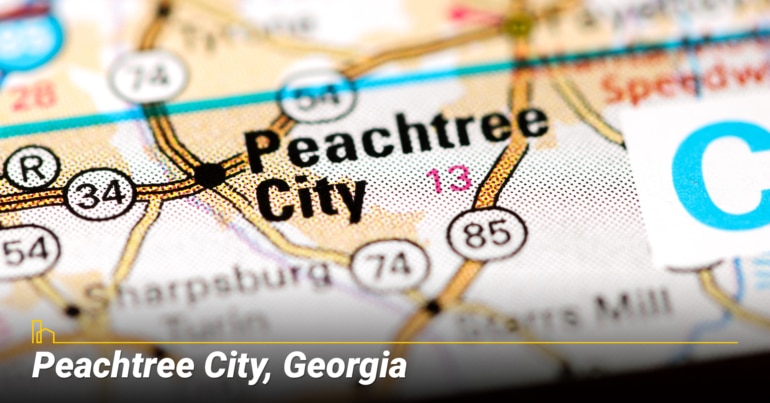
HOMEiA Score: 92/100
- Population: 35,065 | Rank Last Year: #3
- Cost of Living: 12% above the U.S. national average
- Home price to income ratio: $243,500/$76,191 = 3.20 (buying homes is affordable)
- Income to rent ratio: $76,191/$16,104 = 4.73 (renting homes is affordable)
Peachtree City is located south of Atlanta. The population in Peachtree City grew by 11.3% from April 2010 through April 2020, above both the overall U.S. rate of 7.4% and the Georgia rate of 10.6%.
In Peachtree City, 18.6% of the population are seniors over 65 years of age (2019). This is higher than the U.S. overall (16.5% seniors) but lower than Georgia (23.6% seniors). By comparison, 24.9% of the population are under 18 years of age, compared to 22.3% in the U.S. and 23.6% in Georgia.
The median household income in Peachtree City is $101,121, and the median home price is $338,900 (2019 estimates). The unemployment rate is 3.2% (July 2021), which is below both the U.S. national rate of 5.4% and the Georgia rate of 3.7%.
If you live in Peachtree City, you’ll probably want a golf cart, even if you aren’t a golfer. The city’s roads are accompanied by a network of golf cart paths that allow you to get almost anywhere in town. If you are a golfer, there are a number of golf courses and country clubs as well.
Line Creek Nature Area is a great place to get away from the busyness, as are the lake parks located around town.
Peachtree City’s healthcare providers include Piedmont Healthcare and Emory University. The city also has a number of senior care facilities.
The 8 Best Places to Live in Florida For Retirees in 2024
We have presented options that will fit different budgets and needs – there should be a choice for everyone. We have listed the most affordable cities first, though the ranks and index scores are assigned based on a larger set of characteristics that we have reviewed…
Conclusion
As you can see, there are plenty of great cities to live in around the state of Georgia. There’s a little something for everyone and plenty of hospitality, good food and beautiful scenery to go around. Whether you are a young professional just starting out, have a family or are looking to retire, we hope this guide is helpful as you take the first step on this journey.
Bonus: Here is a checklist for moving — some of the most important items to take care of when you relocate.
10 Most Affordable Places to Live in Oregon
Geographically, Oregon boasts dramatic Pacific coastlines as well as volcanic mountain ranges. Its climate spans from rainforests along the coast to semi-arid conditions in the central and southeastern regions. The Beaver State is home to both Crater Lake, the deepest lake in the U.S., and Mount Hood, the second-most-climbed mountain in the world…





